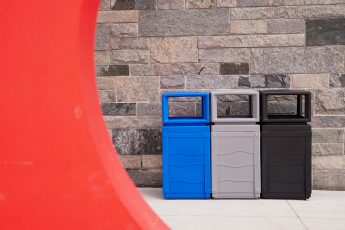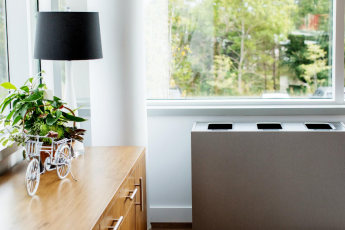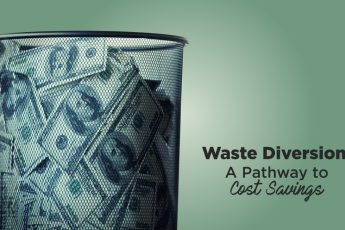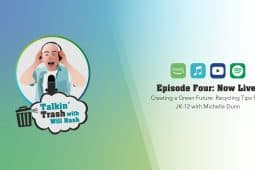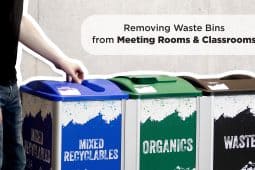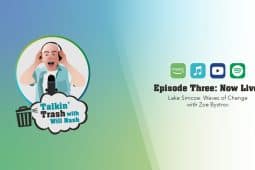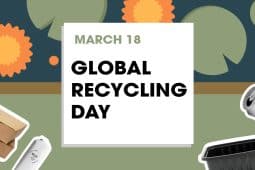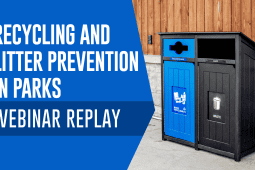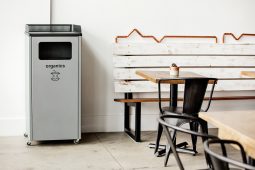We’d like to introduce you to our Senior Advisor, Alec Cooley!
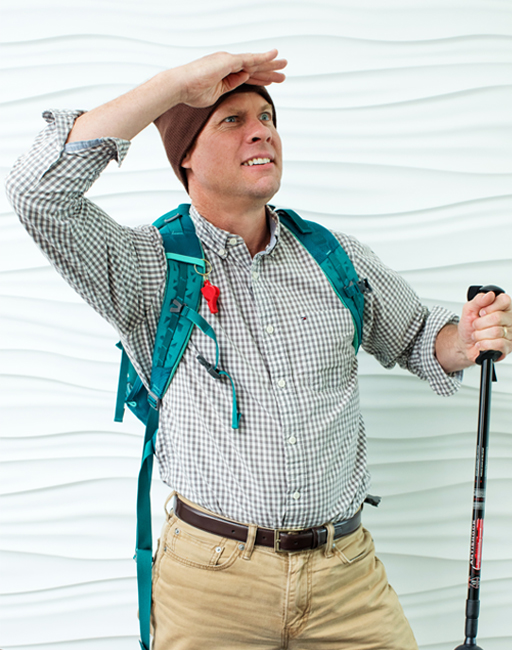
Okay, you have probably seen Alec around here before. In fact, if you’ve spent any time with our blogs and webinars, you already know Alec – he’s the writer behind the Advancing Recycling blog series, and the program creator & moderator for our Green Thinking webinar series. What you may not know is that Alec also does a bundle of invaluable behind-the-scenes work at Busch Systems – and since his position is so unique in the manufacturing industry, and he has so much expertise to offer, we wanted to make a thorough formal introduction!
So, we sat down with Alec Cooley to talk about his role as Senior Advisor here at Busch, the broader recycling & waste reduction industry, and how his path and experiences led him to where he is today.
You bring decades of recycling & waste reduction expertise with you to Busch Systems. Can you tell us about your early experiences and education in this industry?
Like a lot of recyclers from my generation, I kind of just stumbled into this career. I was a history major in school and assumed I would go into teaching. I was interested in environmental issues, and started volunteering with the student-run recycling program. This was the early 1990’s at Humboldt State University, up in the far north coast of California. From there, I was offered a part time job with the local non-profit recycling center, driving a route collecting office paper from local businesses. After graduation, that turned into a full-time job and within another few years I was hired back to the university to manage the recycling and waste reduction program. So doors just kept opening and I walked through them. Next thing you know I had a career in recycling and waste reduction!
I always assumed you studied sustainability & recycling from the get-go! I guess this industry was a bit of a left-turn from your plan of teaching history?
Correct – there was actually no such thing as an environmental studies degree at the time. Most campus recycling programs started as student initiatives, and many first and second generation college recycling managers followed a similar pattern, starting out as volunteers only to be offered a staff position when those programs were incorporated into the school’s formal operations. For those of us with an interest in environmental issues, it was a compelling opportunity. It was exciting to build a program where you could see the immediate, direct impact of your effort. I forgot all about teaching!
Ah, that makes sense. How long were you at Humboldt State University as their recycling manager?
I spent nine years working for the university before packing up and moving to South Carolina. I met my wife through the CURC (College and University Recycling Coalition) professional network – she managed recycling and waste for the Medical University of South Carolina. She won the coin toss when we got married, so I pulled up stakes and moved out to Charleston in 2006. Soon after, I went to work for the National Recycling Coalition (NRC), an NGO based in Washington DC. Working remotely from Charleston, I managed (among other things) the RecycleMania competition, which has since changed it’s name to the Campus Race for Zero Waste. The program is framed as a competition to see which colleges and universities can outdo their peers with recycling and other waste reduction efforts. But at its heart the program uses behavior change techniques like social norming to create a messaging framework that campus sustainability managers leverage to motivate students and staff behavior around recycling and other waste reduction steps. Another role I had at NRC was providing staff support to CURC, which included helping develop and plan workshops and their ongoing bi-monthly webinar series. After I joined Keep America Beautiful (KAB) in 2009 as a director of recycling programs, both RecycleMania and CURC followed me so that I was able to work with both over an extended twelve-year period.
Your work in waste reduction has really spanned across a lot of States and institutions! Was it interesting to see first-hand how recycling works in so many different communities?
Absolutely. Starting out as a collection worker and then managing a program gave me a solid grounding in the realities of operating and growing college waste reduction programs. The work I did at both NRC and KAB added another layer of perspective. During the same period, I also managed a number of grant programs that awarded public space recycling bins to help local communities implement recycling in places like downtown areas, neighborhood parks, and schools. Between my interactions with hundreds of RecycleMania participants, scouting case study presentations for CURC, and reviewing somewhere close to a thousand grant applications and the post-implementation reports that followed, I was able to see how many of the challenges and opportunities I’d faced, with some variations, extend to many communities across the US and Canada.
And on top of all that, you mentioned you’ve served on the board of directors for a couple recycling Non-Governmental Organizations. Can you tell our readers a bit about those NGOs?
I’ve served at different points in time on the board of the California Resource Recovery Association and it’s counterpart, the Carolina Recycling Association, I’m currently on the board of the National Recycling Coalition (NRC). Each of these, along with the other state-level associations, are the meeting grounds where professional recyclers come together. The conferences and networking opportunities they provide are critical to helping local programs learn from each other, and find out what’s worked (and what hasn’t) in other communities. They also support a social network that is really important. The relationships one develops through these networking connections are important for building comradery with others who are juggling the same kinds of issues. That interaction has always been important to recharging my own enthusiasm for the work I do. And I’ve made many decades-long friendships through them.
Has a lot changed in recycling & waste reduction through your years in the industry?
Yes! Recycling was much more of a grassroots effort when I first got involved. At that point it was driven by the environmental community and local and state governments. We were in the throws of the “landfill crises”, when public officials were confronted with what to do with all the waste they no longer had room to bury in the ground. With some exceptions, the private sector had little interest or role in recycling at that point. That of course has changed, as recycling has become an increasingly larger, multi-national economic engine dependent on the scrap material that’s recovered.
Recycling was also pretty low-tech at the time I started. The recycling center I first worked at had a 40-year old bailer that required us to first stomp plastic bottles down with our boots, and then use a snow shovel to scoop them up and into the hopper. It took two hours to make a pretty small bail. Granted, that was on the extreme end of the scale, but today’s MRF sorting facilities are a different world. Optical scanners, robotics, artificial intelligence – the same size facility now can process more material in 15 minutes than we could in four hours!
And we can recover so much more today than we could in the 1990’s. Recycling then pretty much meant cans, bottles, paper, cardboard, and other incidental things. Computers & electronics all went in the trash. Food waste went in the trash. More work is still needed to expend them, but we now have systems in place to divert all sorts of materials that just weren’t an option back then – electronics, food waste, carpeting, batteries, cartons, mattresses, textiles, paint, and landscaping waste to mention a few.
What has been stubbornly slow to change is making progress on the other two “R’s”: reducing and reusing. A lot has been done with new opportunities, especially with reuse, but we have still not cracked the code on how get these adopted on a wide-spread basis. The concept of a circular economy provides a compelling vision for where we need to go, but this will require changing a consumer culture that over 40+ years of effort has not budged in a meaningful way.
It sounds like the industry has come a long way, but there’s still a long way to go. In fact, you spoke earlier about seeing first-hand the challenges local recycling managers face. Can you expand on that?
Well, the most obvious one is that many local programs face a lack of resources & real, meaningful support. A lot of recycling and sustainability managers across the country are essentially a one-person department or working with a small team dwarfed by the scale of the job. There’s an almost endless list of projects and initiatives involved with building a truly comprehensive program that can recover and/or divert a significant part of the waste stream, never mind trying to gear up to the types of circular economy efforts that are the real prize.
On a deeper level, regardless of what the position description says, the fundamental job of a recycling or sustainability manager is to change ingrained patterns of how their community or institution functions. Prodding haulers to provide better data. Persuading custodial unions to accept new service routines. Convincing decision-makers to fund food waste collections. Simply getting people to engage and correctly sort their waste into the provided bins. I could obviously go on. This is difficult work – it’s easy to get discouraged, and feel like you’re just treading water.
And there are other challenges facing local programs, obviously. One that I think we’ve been slow to recognize is the complexity and centrality that individual behavior has to the recycling system. As an industry, we focus a lot on market development, building infrastructure, etc. – all critical areas that need attention. But these efforts can’t achieve anything if we don’t get people to participate and do it correctly – and we still have significant work to do in this regard. To the extent we do focus on individual action, there’s a tendency toward simply communicating “how” and “what” information and assuming people will do the right thing. Some do, many don’t. Or rather, many do some things, but not all of the time. We know many techniques to increase their level of participation – convenient access, social norming, designing infrastructure that intuitively guides correct sorting, etc. But there’s a lot we still don’t know that warrants more research. Many of the best practices we do have – like color-coordinating bins, using clear signage, etc. – are slow to trickle down to local programs, either because other factors prevent their use or decision-makers simply don’t understand or recognize their value… Ok, I’m stepping down from my soapbox.
Alright, let’s turn to a more positive side – where do you see opportunities in this industry? Reasons for optimism?
For local programs still in the building stage, the good news is simply that the wheel, figuratively speaking, has already been invented to a large degree. Despite my last point about the need for more research, we have learned a lot over the years about how to influence recycling behavior. Where thirty years ago public messaging tended to emphasize the environmental benefits of recycling, we now know it’s more impactful to work on simply getting people to make it a habit. We have a better understanding now about how things like custodial service can be managed to influence how people sort items. The key is to disseminate that knowledge to everyone on the front lines doing the groundwork, and get more of these best practices incorporated into the design of programs.
I would also point to a silver lining from the turmoil of the last four years with China’s National Sword policy, market volitivity, etc. It has exposed and created energy to address some of the systematic problems, like contamination, that have held the industry back. The US for the first time has a National Recycling Strategy that was developed by the US EPA in coordination with a range of industry stakeholders. It’s not perfect, but it fills a void that had left recycling to evolve in an ad hoc fashion with no singular vision or agreed-upon goals. In the same spirit, there’s also growing recognition of the need to develop uniform standards to make recycling more recognizable and less prone to confusion wherever people travel – between home, work, the park, vacation, etc. The new strategy includes a focus on standardizing messaging and terminology. Another example is with coalescing around a standard color scheme to represent recycling versus composting or trash. California is out front on this with their SB 1383 legislation, which, among other things, mandates that all bins conform to the increasingly dominant pattern of using the color blue for recycling, green for compost, and grey or black for garbage.
The recent turmoil also appears to be breaking, or at least loosening up, the log-jam around state and federal policy in the US. The economic crises that hit local programs have created momentum at the state level to shift some of the costs to the private sector. Most Canadian provinces have had some form of extended producer responsibility (EPR) in place for years, but the bills that have passed in the last year in Colorado, Maine, and Oregon seemed almost impossible five years ago. Similarly, California’s new truth-in-recycling-labeling is an example of what’s needed to bring greater accountability to the industries that largely control the production of the items that eventually end up in the waste stream.
Now, the kind of work you do as our Senior Advisor is a little unique in the manufacturing industry. Can you tell us more about your position with Busch?
Funny you should ask – it’s a little hard to define, because you’re right, it’s a pretty unique role. I’d describe myself as essentially a “recycling expert in residence”. The two most visible things I do are produce the Green Thinking webinar series and the Advancing Recycling blogs. The webinars generally focus on nuts and bolts aspects of planning waste reduction programs. I try to strike a balance so that attendees hear case study overview presentations, followed by an extensive panel discussions to bring out the details with a more interactive conversation. The blogs are wider ranging. I write about trends and best practices, but also random topics that capture my attention. The ones I enjoy writing the most focus on teasing out learnings from academic studies into recycling behavior that otherwise tend to gather dust on a shelf. Beyond the webinars and blogs, collaborate with the R&D team on new products, advise customers on how to optimize their programs, develop educational materials distributed by the sales and marketing teams, and spend any leftover time planning new ways to help more people set up effective waste reduction programs.
What do you like most about your role?
I miss working directly with a program, and the gratification that comes from seeing the direct impact of the effort that goes into it. The consolation of course is that I get to help many others improve their programs.
There are a lot of smart, knowledgeable people working in the field. Where most are too tied up with the day-to-day aspects of running a program, my role with Busch Systems gives me the freedom to explore and share this knowledge. It also can provide me with a bit of a soapbox to share with a wider audience my take on what’s important and where I think we need to be going as an industry, which is a unique and valuable opportunity.
For the company, my role reflects an understanding that it takes more than just setting out bins to make a diversion program successful. It requires professional knowledge, and the more they can support disseminating that knowledge, the more successful recycling – and ultimately their business – becomes.
What advice can you offer someone starting a career in the recycling/waste reduction industry?
Focus on building people skills. As I mentioned earlier, much of what you’re doing involves getting people to change the way they do things. And that all comes from forming relationships, learning what people do and how they do it, getting to know what people value, and where the common ground is. These are all skills straight out of the ‘How to Win Friends and Influence People’ playbook, and they come in handy.
Along the same lines, political skills are important to hone as well. I say that not in an adversarial sense, but the practical reality that changing the way institutions operate requires negotiating with people that have different priorities and visions. The adage that politics is the art of achieving what’s possible very much applies to the practice of sustainability. Knowing when to push an issue and when not to, learning to identify and align with those who can help advance projects, etc. The ability to navigate the decision-making process with skill and integrity will advance your priorities much further.
And learn to push without being ‘pushy’. It took me awhile in my job to recognize that in a conservative institutional culture, many people say “No” as a default because they don’t want to make the effort to consider how “Yes” could work. Recycling and sustainability are often perceived as feel-good, non-essential activities. Without an extra push, they get treated as a low priority.
So the last thing I’d say is to be resilient. It’s easy to get discouraged. Change rarely comes as fast you want it to, and it’s impossible to be effective if you settle into the perception your effort makes no difference. The fact is that change you’re making isn’t always visible. But, the effort to advocate new programs or operational changes is often just the first step in a long process of making big changes to people’s minds & hearts, even if the short-term answer is “No”.
Interested in learning more from our Senior Advisor Alec Cooley? You can access all of his Advancing Recycling blog posts here, and all of our past Green Thinking webinars here.
Want to learn more about our team here at Busch? You can ‘meet’ our whole team on our website here!

